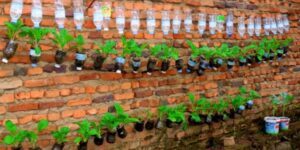By Nicholas Lokuya Emmanuel Lemi
South Sudan is among the few countries in sub-Saharan Africa with huge potential in agriculture production owning to its absolute and comparative advantage over many countries within our region, in terms of soil infertility, availability of the fresh Nile waters, swamps and good climate coupled with the youthful human resource.
Food is an important necessity that a family cannot afford to go without as it nourishes our body and sustains life, however, the global economic crises make it difficult for many urban dwellers in Juba to put food on their table.
In Juba, South Sudan, many households buy food commodities including vegetables on a daily basis from the market, the unpredictable daily increase in food prices is rendering many families food insecure resulting in malnutrition and extreme poverty.
Backyard farming becomes a solution to food insecurity and poverty in South Sudan, as it requires a small space within a home state where vegetables and other crops can be grown, using the available resources within a household. Backyard farming is sustainable and will help us (South Sudanese) to reduce over-reliance on food imports from our neighbouring countries and also over-reliance on food aid from non-governmental organizations. Solving food insecurity issues at the household level is a way to go for any nation to prosper.
It is therefore, paramount for the government to enact policies which promote urban and backyard farming in all cities and towns (Juba, Awiel, Wau, Bor, Malakal, Bantiu, Kuajok, Zambio, Torit, Yei, Rumbek, Maridi, Nimule, among others). The non-governmental organization should mostly engage in equipping South Sudanese with knowledge and skills for sustainable development and reduce on just giving food aid, as the phrase goes “Don’t give me fish but teach me how to catch the fish’’.
Backyard farming is a technique where crops are grown and animal reared within a home state in small spaces, or in sacks, and bottles, among others. This technique offers a sustainable solution to food insecurity and poverty in South Sudan. It is significant to make use of the free small spaces within our home state for backyard farming, crops which can be grown in backyard farming include all vegetables (cowpeas leaves, Amaranth, cabbages, kudra, okra, cucumber, tomatoes, green peppers, eggplants, spinach, Sukuma-wiki, nakati, beans, onions, sweet potatoes, carrots, Irish potatoes, among others), and animals that can be reared includes (Chicken, rabbits, ducks, turkey, pigeons, pigs, goats, sheep, among others). The crops used in backyard farming requires small amount of water for them to grow, therefore, kitchen water can also be used for irrigation. The farmer can harvest a large quantity of vegetables for food consumption rendering the household food secure, and also the vegetables can be sold in the local markets to get income hence liberating the family from poverty.

Backyard farming Sack mounts gardens
Sack mount gardens
This is a technique of backyard farming where crops are grown in sack filled with soil. This technique is very simple to make and it requires very small space just for a sack to stand, the procedures are as follows; get a sack, fill the sack with soil, put some small stones in the middle of the sack as you fill the sack with soil, then make zigzag holes at the sides of the sack using a knife or hot plate, irrigate the sack well, get your seedlings and transplant them into the sacks at sides and on top of the sacks. The crops that can be grown in sack mount gardens includes; cabbages, okra, cucumber, tomatoes, green peppers, eggplants, spinach, Sukuma-wiki, nakati, onions, sweet potatoes, carrots, Irish potatoes. The more the sacks mount the greater the harvest and subsequently higher income. This technique is environmentally friendly as it requires the use of plastic sacks which are collected from the environment, thus reducing the risk of plastics polluting the soil, water and the air when they are burnt.

Bottle farming
This is a form of backyard farming where environmentally hazardous bottles are collected from the environment and are tactically shaped for planting crops within a home state. The tools and equipment needed include; plastic bottles and razor blades to facilitate the shaping of the bottles. The crops that can be grown in sack mount gardens include; cabbages, okra, cucumber, tomatoes, green peppers, eggplants, spinach, Sukuma-wiki, nakati, onions, sweet potatoes, carrots, Irish potatoes. This technique is environmentally friendly as it will solve the problem of plastics polluting our soil, and water bodies, and blocking drainage channels. Its significant role is solving the problem of food insecurity and poverty within the city.




